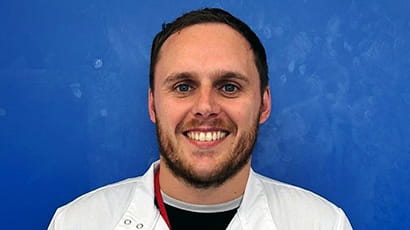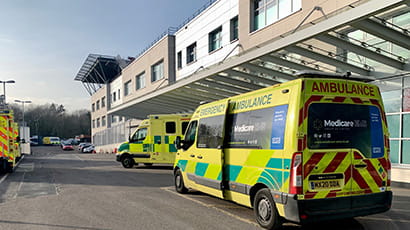Study explores women's experiences of medical tattooing

A recent study by the Centre for Appearance Research at UWE Bristol has explored women's experiences of medical tattooing.
Having an appearance-altering condition, such as alopecia, and its ongoing treatment, can have a significant impact on people’s lives and emotional health. Despite the wide range of medical treatments available, the success rate of these treatments can vary and the side effects can be unpleasant.
Senior Research Fellow Nicola Stock said: “Alternative treatments, such as medical tattooing, are becoming more popular. However, medical tattooing is a largely unregulated industry and we don’t yet have a good understanding of the benefits and risks involved, or how to achieve the best outcome for the individual.
“The study was launched to find out what motivated women to choose medical tattooing and how we could learn from their experiences to support others.”
The research team at the Centre for Appearance Research carried out individual telephone interviews with 25 women aged 26-67 years who had experience of medical tattooing in the past five years. Most participants reported a form of hair loss as a result of alopecia, lichen planopilaris or ectodermal dysplasia, and had chosen to have their eyebrows and/or eyeliner tattooed.
Participants had chosen to undergo medical tattooing to alleviate appearance concerns, and to restore self-confidence, identity and/or femininity. Most participants were satisfied with the outcome and would recommend medical tattooing to others.
Amy Johnson lost her eyebrows and eyelashes to alopecia areata in 2010. She said: “Without my eyebrows I no longer recognised the face staring back at me in the mirror. Following a medical tattooing procedure, I identified with my reflection once more and my new eyebrows really helped to boost my confidence. Having medical tattooing isn’t for everyone, but it certainly helped me in my own journey with alopecia”.
However, the study also identified a need for better regulation of medical tattooing. Leading charity Alopecia UK stated: “Having access to medical tattooing can give people back what they have lost, which can provide a huge boost to confidence. If someone decides they wish to undergo a medical tattooing procedure, we would always recommend that they consult with a suitably qualified professional and ask to see evidence of their work with clients with alopecia.”
Rae Denman, medical tattooist and collaborator on the study, commented: “The emotional impact of hair loss should not be undervalued. Treatment to restore appearance due to a medical condition should be distinguished from the beauty industry and should be recognised as a medical need.”
The team hope this research will help to raise awareness of medical tattooing and its risks and benefits among health professionals and individuals who have experienced hair loss.
Related news

12 December 2025
UWE Bristol’s environmentally conscious and student-focused accommodation wins three awards
Purdown View, the world's largest certified Passivhaus student accommodation development, has been recognised at Property Week Student Accommodation Awards.

13 November 2025
Alliance Medical and UWE Bristol launch UK’s first PET-CT postgraduate certificate
In a move set to transform imaging education, Alliance Medical (AML) and UWE Bristol have joined forces to co-design and develop the UK’s first PET-CT Postgraduate Certificate (PG Cert).

10 November 2025
Lessons from Low Traffic Neighbourhoods will drive better public engagement, study finds
Lessons from Low Traffic Neighbourhoods have informed a new toolkit to improve engagement with the public on challenging local street issues.

29 September 2025
Smartphone use hitting struggling pupils hardest, major study finds
Young people struggling with their studies at school are much more likely to have negative experiences on their smartphones than their better performing peers, a major new study has found.

11 September 2025
New study to investigate augmented reality as an intervention for emotionally based school avoidance
A UWE Bristol researcher will support a new study exploring whether an augmented reality board game can help young people with emotionally based school avoidance (EBSA).

28 July 2025
Student wins bronze medal at World Aquatics Championships on her graduation day
UWE Bristol sports rehabilitation student Izzy Thorpe made waves at the World Aquatics Championships winning a bronze medal in artistic swimming on the same day she was meant to be crossing the stage at her university graduation ceremony.

28 May 2025
Leading organisations fighting to end youth violence in cities join UWE Bristol event panel
Leaders from Bristol-based Empire Fighting Chance and Canadian non-profit REACH will speak at the next Bristol Distinguished Address Series.

09 May 2025
UWE Bristol among first universities in UK to introduce sanitary waste bins in male toilets
UWE Bristol is among the first universities in the UK to introduce sanitary waste bins in male toilets for the disposal of incontinence products.

11 April 2025
UWE Bristol academics among emerging scientific leaders to receive share of £7.6m for health research
Two UWE Bristol researchers are among the recipients of a £7.6 million investment from the Academy of Medical Sciences aimed at tackling urgent health challenges.

09 April 2025
New research to support a thriving health and care workforce is launched
A national research partnership will explore ways to support wellbeing and sustainability in the NHS and social care same day and urgent care workforce.

10 March 2025
UWE Bristol to explore the power of open water swimming at upcoming event with The Wave founder Nick Hounsfield
An inspiring tale of grit and resilience will be told to audiences at the first BDAS event of 2025 as UWE Bristol welcomes Nick Hounsfield, founder of The Wave.

28 February 2025
Paramedics in GP surgeries may ease workload but not NHS costs, study finds
Paramedics working in GP surgeries help reduce GP workload but do not contribute to cost savings to the NHS, according to the first major study of the clinical and cost-effectiveness of paramedic compared with GP consultations.






